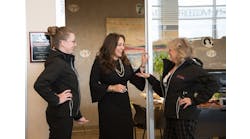6 Business Bottlenecks Holding You Back From Achieving Your True Potential
Two shops, on the brink of sinking.
One in Oklahoma, trying to survive after a record low month of only $16,000 after two shop employees embezzled cash and destroyed vendor relationships.
And one a few states away in Kentucky, with newly discovered debt of over $200,000 after a “trust your gut” mentality went awry.
Both Brandon Crusha of Brotherhood Garage in Yukon, Okla., and Ryan Hillenbrand of Urbs Garage Incorporated, in Burlington, Ky., were faced with a decision. Do they throw in the towel, or do they put in the massive amount of work and dedication needed to rebuild their businesses?
Both chose to rebuild.
By addressing their shops’ bottlenecks, Hillenbrand and Crusha have been able to reach huge amounts of growth, and have successfully saved their shops from going under.
Below are their stories, their isolated bottlenecks, how they were able to solve each one of them to obtain growth and security, and how other shops can do the same.
“I’m really good at what I do, because I used to be really bad at what I do,” Hillenbrand says.
On the Brink: From the Inside Out
How Brandon Crusha rebuilt after recovering from an inside theft issue
SHOP STATS: Brotherhood Garage Location: Yukon, Okla. Operator: Brandon Crusha Average Monthly Car Count: 130 Staff Size: 5 full-time Shop Size: 5,000 sq ft Annual Revenue: $743,000
In mid-2017, Brandon Crusha returned to his Oklahoma shop after attending an out-of-town coaching program to find a shop owner’s worst nightmare. While Crusha was gone learning how to ramp up and build his business, members of his staff were back at the shop, destroying it. They embezzled cash, ordered parts and sold them, and failed to pay the shop’s bills.
This started a downward spiral for Brotherhood Garage of disgruntled employees and cash flow issues.
In November 2017, Brotherhood grossed a total of $16,000 with five people on staff.
“I could either focus on finding all the proof, and sending them [the employees] to jail. or I could focus on saving my business. I decided to focus on saving my business,” Crusha says.
After seeing some of Aaron Stokes’ posts on Facebook, Crusha signed up for one of his courses and began implementing some of the techniques. Stokes visited Brotherhood Garage and encouraged Crusha to move to a different location he had been eyeing to get out of the now-toxic environment. Over the course of December 8–11, 2017, Crusha moved Brotherhood Garage to an entirely new location, let go all of his staff except for one tire and lube tech, and reopened shop.
This lit a fire in Crusha.
In 2017, Brotherhood Garage brought in $395,000 with 897 cars. In 2018, it brought in $743,000. Crusha has been able to pay off all his debt from the theft, and set an annual revenue goal of $1.5 million for 2019.
“I now run the shop the way it should be run—as a business—instead of as a mechanic just trying to operate a business,” Crusha says.
The Bottleneck: Low Car Count and Lack of Customer Growth
One of the first ways Crusha began rebuilding Brotherhood Garage was by going back to his roots, he says. A lot of it comes down to finding the right coach. Crusha’s previous coaching company advised him not to say “yes” to walk-in customers. When Crusha switched coaches to one better suited for himself and his shop, he reversed that mentality—and growth began.
“His [Stokes’] coaching company taught me some different methods—a lot different than what I have been taught by the previous coaching company,” he says. “It’s more inline with what I believe, and how I think a business should be run.”
Following the advice of his previous coaching company, Crusha was told to build and follow a schedule. They explained that people would just bring their cars in for the appointment and that would help build stability. But Stokes’ blew that out of the water with the “yes” mentality, Crusha says.
“We are a very ‘now’ society. If someone told me I had to wait three days to get my car looked at, I would find somewhere that could look at it today,” he says.
And that’s exactly how he used to run his shop, a mentality he’s returned to with great results. Now, when customers bring their vehicle in day of, Crusha’s staff will still take a look, even if they don’t have time to fix it that day, he says.
“It gives people peace of mind to know what’s wrong [with their car] and how much it’s going to cost. As long as I can do that, people are happy,” Crusha says.
The Solution: Follow the “yes” mentality.
The Bottleneck: Absence of Visibility to Potential Customers
When Crusha moved Brotherhood Garage to the new location, he put his marketing in high gear. He changed everything about the shop’s branding, except for the name. It was a fresh start, he says. A new logo, website and advertising plan were put into action with his marketing company.
“I didn't know how I was going to afford it, but I told them to go wild with marketing,” says Crusha.
He says that if they did their job, he wouldn’t have to worry about the money he was spending. Brotherhoodgarage.com is now clean, easy to navigate, and makes it simple for customers to learn about their services.
Before Brotherhood Garage was on on the brink, Crusha didn’t put money toward direct mail advertisements. He thought he couldn't afford it. Since allocating money to his marketing, Crusha now sends 10,000 mailers out per month to bring in new customers and attribute to growth.
His marketing company also runs his social media and keeps him top ranked on Google, whereas before, the marketing agency only managed his website and SEO, and gave tips for his Facebook. Jumping all in and investing in a full marketing plan, instead of the basic guidance, has given Crusha confidence in how his shop is portrayed to the public.
The Solution: Put your trust in a marketing investment.
The Bottleneck: Untrustworthy and Unreliable Staff
Needless to say, Crusha had a staff issue. He was previously advised to grow his team, but some of the employees he brought in ended up committing the greatest betrayal. After firing the employees that stole from him, he moved shop with only one remaining staff member. Crusha was forced to rebuild his team. But this time he was determined to pick the right people.
“When I started building my team this year, I was just really selective, and it worked for me,” he says.
By looking beyond pure skill, Crusha now looks deeper into who the individual is outside of his or her industry knowledge and technique.
“You can turn a wrench, and you can be one of the best mechanics out there, but that doesn't mean I’m going to hire you,” Crusha says. “I’m looking for a certain attitude and a certain willpower. I’m really looking for someone I can depend on and I could call family.”
Beyond hiring the right people, the embezzlement, unfortunately, taught Crusha an important lesson in trust. To ensure his staff never steals from him and Brotherhood Garage again, he put in place strict guidelines.
Crusha sets these guidelines with his vendors, by setting up specific working hours that his employees are allowed to purchase from them. The previous fraudulent purchases happened outside work hours, and this ensures that the same issues won’t arise. He also has it set up that if someone does attempt to purchase something after work hours, the vendor must make a phone call to Crusha to verify the purchase.
The Solution: Be selective with strict guidelines.
On The Brink: Within the Pages
How Ryan Hillenbrand bounced back and grew his shop after discovering deep debt
SHOP STATS: Urbs Garage and Collision Center Location: Burlington, Ky. Operator: Ryan Hillenbrand Average Monthly Car Count: 230 Staff Size: 12 Shop Size: 15,000 sq ft Annual Revenue $1.3M in Repair Shop, 1.9M total
After Ryan Hillenbrand graduated college with his engineering degree, he had no plans of jumping back into the family business. But, in 2008, his dad asked to come back and help out. Two years later and Hillenbrand began running Urbs Garage and Collision Center, an auto repair, collision repair and truck repair shop. But with a degree in engineering and only the knowledge of how his dad ran the business, he was not ready for the aftermath of the recession.
“When I came back from school, I just started running it as I saw it, which was basically just operating the business, not paying attention to the books or the cash flow,” Hillenbrand says.
He grew up watching his dad run the business, who never looked at the books and followed the “trust your gut” mentality. And it worked for his dad. They made good money over the years. So it only made sense that Hillenbrand followed suit.
And then the recession hit.
The price of everything rose, and greatly affected the shop and its clients. Numbers decreased. But Hillenbrand’s bookkeeper continued to tell him that their numbers were good and everything was fine. He continued investing in the much-needed upgrade of the shop’s equipment, without truly knowing the state of the shop.
But after his bookkeeper left, Hillenbrand took a look at his numbers. Urbs Garage was in roughly $200,000 of debt.
They were now on the brink, and huge changes needed to be made to save the shop.
“I had issues in my office, I had issues in my car shop, I had issues in my body shop, and we started raising one ship at a time,” Hillenbrand says. “I sold the records, I reinvested that capital back into the company and then we were able to pay off the bills while we invested in the new technologies that we needed to, to become a sustainable shop.”
Urbs Garage’s repair shop has already reached $1.3 million for the year in the car shop, and the body shop went from making $150,000 per year to $500,000, with plans to boost that to $1 million in 2019. It finished 2018 at $1.9 million in total sales.
“You have to track the leaks in the boat before you can track the money coming in,” Hillenbrand says.
The Bottleneck: Lack of Business Knowledge
While putting together the pieces of rebuilding Urbs Garage, Hillenbrand realized how little he knew about running a business. So he made the decision to delve into education.
“I got really invested in the education side of it, because I realized how valuable it was and how stupid I really was at running my own business,” Hillenbrand says.
He got involved with three coaching companies, as well as went back to school.
“I went back and started working on my MBA, because my engineering education didn't really get me the tools I needed to succeed in running a business,” he says.
Through Hillenbrand’s investment in self-education, he began to learn how to read balance sheets and profit and loss statements, areas to which he says he was otherwise ignorant. The decision to become aware of the numbers gave Hillenbrand a look into the trouble Urbs Garage was truly in.
“When you start reading the numbers, it gets pretty scary,” he says.
He began going through the shop’s financials and became aware of the gravity of their situation. He was $60,000 in debt with state taxes, and $140,000 in debt with the IRS.
“I had been operating all these years with the assumption that things were OK,” says Hillenbrand.
Beyond being able to analyze his shop’s number, Hillenbrand began learning countless tools and techniques that have turned him into a successful shop owner and businessman.
“What it really boils down to is education, training and just paying attention to the details and going from there,” he says.
The Solution: Invest in self-education.
The Bottleneck: Poor Employee Attitude
Hillenbrand describes the old company culture at Urbs Garage as “really sad.” Employees would just come into work and then go home, and the general attitude was poor, he says.
“My service advisor used to call customers and he would start with, ‘Are you sitting down?’ You're already setting yourself up for failure when you start with that,” Hillenbrand says.
He also had experiences of talking to technicians about a comeback, only to get the response, “Well, it’s not my problem.”
As part of the rebuilding process, Hillenbrand let go both of the service advisor and technician and brought in fresh talent.
“We started hiring in good people, with good hearts,” he says.
Hillenbrand started working with his tool suppliers, who helped him find his current head technician. He says that once he brought in one great employee, other good employees started to follow.
“All of a sudden, our tickets started to change and our culture started to change, and people started picking up on this,” Hillenbrand says.
He says that his current team is comprised of hustlers and hard workers. This new sense of determination and team culture aided with raising the boat of Urbs Garage.
“I was sitting here focusing on the business. I wasn’t focusing on the people and when we started focusing on the people, it started to change our culture and it started to change us making money,” Hillenbrand says.
The Solution: Focus on your people.
The Bottleneck: Low Technician Efficiency
Another issue that Urbs Garage faced was low technician efficiency. Hillenbrand began looking at billed hours in relation to what they brought in and came to the conclusion that they didn’t get jobs done in the time they needed to be.
“The No. 1 thing for us was technician efficiency. We went from 50 percent efficiency up to 100 percent when we started getting good people in here,” he says.
Hillenbrand also began eliminating waste, like the towing Urbs Garage used to offer, which turned out to be unprofitable.
“No matter how much trouble you go through with finding people and no matter how much trouble you go through with car count, if you can be efficient and eliminate waste, you can, at the very least, survive. You can make a little bit of money before you find those other things that will make you a lot of money,” says Hillenbrand.
The Solution: Pay attention to billed hours and waste.
“When you are in the battle each day at work trying to fight out of a hole, it’s very hard. But remaining focused on winning is the goal. You have to have the fire and the will to succeed,” says Hillenbrand.



